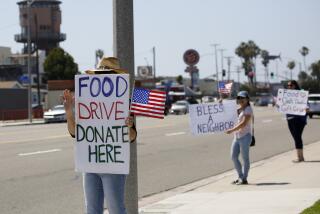Volunteerism: A Way to Grind the Callouses Off Our Hearts
- Share via
Four thousand hours. One hundred weeks. Two years of our lives.
That’s asking a lot.
So here’s a toast to your daring, Mr. President. Count me in. Consider this a pledge. Two years.
Not since John F. Kennedy has a sitting president summoned citizens to the cause of their country. At least not like this. And even Kennedy didn’t ask so much, so directly. And lest we forget, Kennedy spoke to a different era, one with fresh memories of World War II and collective national effort.
As I recall the moment 41 winters ago, Kennedy’s challenge--what could we do for the good of the U.S. rather than the other way around--was one of those political high notes that shaped the way we viewed ourselves.
Regrettably, those words have become quaint, belonging to the fairy tale of America more than the reality.
Do-gooders remain, but apart from the hustling imperatives of larger society. The gap between those who give and those who take in America has grown vast.
Some of my friends are cynical about George W. Bush’s new and unexpected summons to service. In fact, there’s been a lot of silence on the subject. Don’t talk about it and maybe it will go away.
Not me. I’ll be soupy--because that’s the point of community. Grind some of those calluses off your heart.
We have a choice. We can approach life with the attitude of Ralph Waldo Emerson, who said, “To live without duties is obscene.” Or we can borrow from Oscar Wilde, “Duty is what one expects from others.”
Bush’s State of the Union call to expand the domestic AmeriCorps and Senior Corps was nearly lost between his report on the war and partisan skirmishing over the economy. It has been overshadowed, as well, by the headlines of Enron.
But the cultural consequences are likely to be as profound and lasting as anything of this age if Bush, and we, actually follow through to create a resurgent and unifying national spirit of volunteerism.
When I came of age in the 1960s, public service was a decidedly conservative idea. I was surrounded by young people, the liberals of that time, who were free spirits.
They were me-first individuals.
To them, collective duty was an establishment idea. It belonged to their parents’ generation. They turned their backs on it. And it didn’t help that “service” meant primarily the military draft.
That thinking, of course, has been turned inside out now. Today, many conservatives define themselves by a rigid ideology of economics: Free-market capitalists are the me-first individualists of the moment.
Duty has become an expression of government oppression and a liberal notion.
Odd, isn’t it?
Dick Armey, the GOP leader of the House and the man who wrote much of Newt Gingrich’s “contract with America,” responded to Bush in full roar, berating government-sponsored community service as “obnoxious.”
“The idea that government can teach charity to America rings very hollow with me,” said Armey. Criticism not being enough, the Texas congressman added mockery. His 4,000 hours? He’d spend them playing poker. Ha ha.
Bush would do his country lasting good to battle Armey and this cynicism to the death.
Teaching good deeds is not the point. Expecting them is. Our social collective--that is, us, through the organization of government--could only be strengthened by reactivating that old word “obligation.”
Service is different from charity. Charity ought to be private. But service ought to be public. Personally, I think it ought to be mandatory, but that’s another topic.
Most of the college professors I know think that students would be better off with an interval of real-world experience after high school. Retirees should have every reason to give back to a society that has allowed so many of them to prosper. Mid-life career reevaluation need not be a crisis.
At the least, those people who volunteer to build houses, to assist the frail, to tutor children or for a thousand other worthy tasks, those willing to give for nothing or for a sub-minimum wage stipend of $9,300--deserve esteem.
Just as our military rates our respect, we owe our service volunteers official approbation so they can walk tall among us.
Just so you know: My wife works for Habitat for Humanity, one of scores of private agencies strengthened by the efforts of AmeriCorps volunteers. I’ll introduce a few of them to you in the near future.
More to Read
Sign up for Essential California
The most important California stories and recommendations in your inbox every morning.
You may occasionally receive promotional content from the Los Angeles Times.










